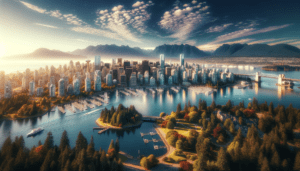
Safety Score

Known For
- Natural beauty
- Mountains
- Forests
- Beaches
- Skiing
- Hiking
- Camping
- Food
- Wine
- History
 Covid Status
Covid Status

Risk Level
High
Vaccination Progress
Daily new cases
100k
Infection rate
Positive test rate
% Vaccinated
The best time to visit British Columbia depends on what you're looking to do while you're here. If you're interested in outdoor activities like hiking and camping, then the best time to come is during the summer months. However, if you're more interested in city life and cultural attractions, then the best time to visit would be during the shoulder seasons of spring and fall.
The weather in British Columbia varies depending on what region you're in. In general, the coastal areas are milder year-round than the interior regions. The summers are usually warm and dry, while the winters can be cool and rainy.
Again, this depends on the time of year and what region you'll be visiting. However, some items that might be useful to pack no matter when or where you're going include comfortable walking shoes, layers of clothing that can be added or removed as needed, and rain gear.
There is no one-size-fits-all answer to this question, as your travel costs will depend on a number of factors such as where you stay, how you get around, and what kind of activities you want to do while you're here. However, as a general rule of thumb, you can expect to spend around $100-$200 per day on your trip to British Columbia.
Again, this will depend on your personal preferences and itinerary. If you're planning on doing a lot of hiking and camping, then renting a car would be the best option. However, if you're mostly interested in exploring cities like Vancouver and Victoria, then public transportation or a rideshare service would be more convenient and cost-effective.
Some of the most popular tourist attractions in British Columbia include Stanley Park in Vancouver, Butchart Gardens in Victoria, and Whistler Blackcomb Resort for skiing and snowboarding.
Some restaurants with popular foods in British Columbia include salmon, Vancouver-style sushi, and Nanaimo bars.
If you're looking to save money on your trip to British Columbia, some helpful tips include staying in hostels or Airbnb rentals, cooking your own meals instead of eating out, and using public transportation instead of renting a car.
British Columbia was originally inhabited by Indigenous peoples for thousands of years before being explored and colonized by Europeans in the 18th century. It officially became a province of Canada in 1871.
 Covid Status
Covid Status